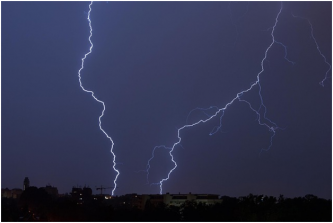
By Sara Bell
Image via Pixabay by panicci
November 10, 2015 (San Diego’s East County)--In many places throughout the country, thunderstorms—and the rain, wind, hail, and lightning that come with them—are unavoidable. And in fact, according to the National Weather Forecast Office, lightning from thunderstorms causes “several hundred million dollars “ in property damage each year, while hail causes $1 billion in damages each year.
You might think that since there is nothing you can do to prevent thunderstorms, there’s nothing—other than staying indoors—that you can do to protect yourself, your family, and your home from their, sometimes, devastating effects.
In truth, when you have a solid understanding of thunderstorms and the dangers associated with them, you can do a lot to stay safe. Here are a few facts to keep in mind the next time a thunderstorm pops up in your area.
When protecting your home, preparation is key. You usually don’t have much advance warning before a thunderstorm strikes. That’s why it’s important to take steps to protect your home while the weather is nice. For example, this article on severe thunderstorms recommends making sure outdoor items—such as patio furniture—are secure. It also suggests removing any debris or loose branches around your home so that they won’t be blown into a window or damage your siding if they’re picked up by a gust of wind.
Stay away from water. You’ve likely heard that you should avoid taking a shower during a thunderstorm. But as this article on thunder and lightningexplains, everyone in your family should also avoid hand washing, dish washing, and doing laundry. That’s because “metal pipes for plumbing can conduct lightning.” Be smart and stay away from all running water until the storm has blown over.
There doesn’t have to be rain for there to be danger. If menacing clouds start to roll in but it never actually starts raining in your area, you might assume that you and your family have avoided the worst of the storm. But, according to the National Oceanic and Atmospheric Administration, the effects of the storm can still be felt outside the areas of heavy rain. For example, it notes that lightning “can strike as far as 10 miles from any rainfall.”
It isn’t the thunder that’s upsetting your dog.Of course, if you have four-legged family members, you’ll want to keep them safe during the storm, too. Many dogs can become very upset during a noisy storm. But as this article on dogs and thunderstorms points out, it may not be for the reason you think. It clarifies that it isn’t the thunder that’s upsetting your dog, it’s the static electricity. To help them stay calm and experience less anxiety during the storm, put them in a grounded spot in your home, e.g. a porcelain bathtub, or rub a dryer sheet on their fur.
Unplug electronics.These days many of us hold our devices—computers, TVs, tablets, etc.—in high regard. Unfortunately, they can be at high risk during a lightning-heavy thunderstorm. As this article explains, the absolute best way to protect your devices (and yourself!) is to unplug electronics and disconnect phone lines during storms. However, it notes you could also install surge protectors. They help protect electronics by preventing “surges in electrical current from reaching your equipment.” Many offer guarantees that provide reimbursements to you for any equipment damaged while the surge protector was in use.
You can’t avoid the dangerous side effects of the storms that hit your area, but when you have a strong understanding of them, you can take steps ahead of time to keep your family safe once the rain, thunder, and lightning roll in.
Sara Bell grew up in a family of teachers—her dad has taught high school for 30 years and her mom is a university professor. AtEducatorLabs, she puts the lessons they instilled in her about the importance of curiosity and learning to great use. When she isn’t working, she enjoys reading, writing, and knitting.







Recent comments